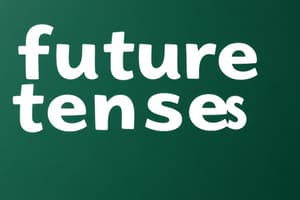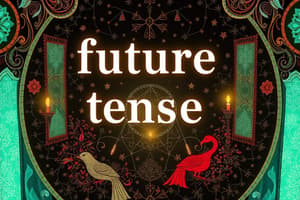Podcast
Questions and Answers
What is the primary function of the simple future tense in English?
What is the primary function of the simple future tense in English?
- To indicate an action that is in progress at the moment of speaking
- To indicate an action that started in the past and continues up to the present
- To indicate an action that will be completed at a specific time in the future
- To indicate an action that will happen in the future (correct)
How is the future continuous tense typically formed?
How is the future continuous tense typically formed?
- By using the phrase 'will have been + verb-ing'
- By using the phrase 'will + base form of the verb'
- By using the phrase 'will have + verb-ed'
- By using the phrase 'will be + verb-ing' (correct)
What is the main function of the future perfect tense?
What is the main function of the future perfect tense?
- To indicate an action that will start and finish in the future
- To indicate an action that will continue up to a specific time in the future
- To indicate an action that will be in progress at a specific time in the future
- To indicate an action that will be completed at a specific time in the future (correct)
Which tense is used to indicate an action that will start and finish in the future?
Which tense is used to indicate an action that will start and finish in the future?
What is the general term for the different ways to express future actions or events in English?
What is the general term for the different ways to express future actions or events in English?
How many main future tenses are there in English?
How many main future tenses are there in English?
Which tense is formed by using the phrase 'will have + past participle'?
Which tense is formed by using the phrase 'will have + past participle'?
What verb form is used to indicate an action that will continue until some time in the future?
What verb form is used to indicate an action that will continue until some time in the future?
Which type of verbs cannot be used in the continuous tense, requiring the future simple tense instead?
Which type of verbs cannot be used in the continuous tense, requiring the future simple tense instead?
Which verb tense is suitable to express future plans and predictions for continuous actions?
Which verb tense is suitable to express future plans and predictions for continuous actions?
In 'She will have left for Paris by then,' how does 'will have' impact the verb 'leave'?
In 'She will have left for Paris by then,' how does 'will have' impact the verb 'leave'?
Which type of sentences typically use future tenses to communicate about upcoming events?
Which type of sentences typically use future tenses to communicate about upcoming events?
Flashcards are hidden until you start studying
Study Notes
The Future Tenses in the English Language
The English language has several ways to express actions or events that will occur in the future. These are called future tenses. There are four main future tenses in English: simple future, future continuous, future perfect, and future perfect continuous. Each of these tenses has its own unique form and usage.
Simple Future
The simple future is used to indicate an action that will happen in the future. It is formed by using the word "will" followed by the base form of the verb. For example, "We will go to the beach on Friday." In this sentence, "will" changes the main action verb "go" to the future tense. The verb "go" appears the same way as it does in the present tense, with no special ending.
Future Continuous
The future continuous, also known as the future progressive, is used to indicate an action that will be in progress at a specific time in the future. It is formed by using the phrase "will be + verb-ing." For example, "She will be sleeping at a hotel tonight." In this sentence, "will be" changes the main action verb "sleep" to the future continuous tense.
Future Perfect
The future perfect is used to indicate a completed action in the future. It is formed by using the phrase "will have + past participle." For example, "They will have eaten dinner by 8:00 PM." In this sentence, "will have" changes the main action verb "eat" to the future perfect tense, and the past participle of "eat" is "eaten."
Future Perfect Continuous
The future perfect continuous, also known as the future progressive perfect, is used to indicate an action that will continue until some time in the future. It is formed by using the phrase "will have been + verbing." For example, "Next year, he will have been working here for six years." In this sentence, "will have been" changes the main action verb "work" to the future perfect continuous tense, and the present participle of "work" is "working."
It's important to note that some verbs, known as stative verbs, cannot be used in the continuous tense. These are verbs that describe states, feelings, thoughts, and opinions. Instead of the future continuous, we use the future simple tense for these verbs. Examples of stative verbs include "know," "understand," and "believe."
Future tenses are an essential part of the English language, allowing us to make plans, express predictions, and communicate about future events.
Studying That Suits You
Use AI to generate personalized quizzes and flashcards to suit your learning preferences.




